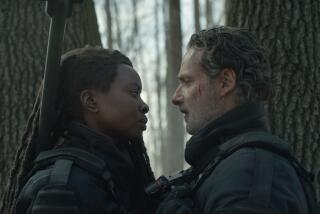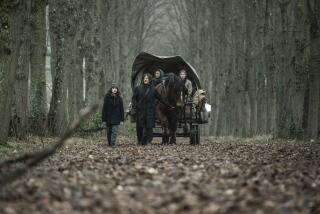Review: ‘Walking Dead’ starts Season 4 on quieter note, for now
- Share via
Since the end of its first season, the narrative direction of “The Walking Dead” has been a, um, bone of contention.
Based on the graphic novels by Robert Kirkman (who serves as executive producer), “The Walking Dead” leveraged a built-in audience to become AMC’s first real big ratings hit. Issues of plot and pacing dog any adaptation, but creative differences have separated the show from its show runner twice already — Scott Gimple recently took over Season 4, which premieres Sunday night.
Mercifully, the disagreements didn’t affect the show itself. Until now. Last year’s complicated and emotionally devastating storylines (Is the rise of fascism inevitable in the aftermath of the zombie apocalypse? Discuss.) are a tough act to follow. Do you go with something bigger or smaller?
“The Walking Dead” chooses both.
PHOTOS: Behind the scenes of ‘The Walking Dead’
In the first two episodes, the choices the writers face — between battle and reconstruction, spectacle and intimacy — are very apparent. Sometimes the indecisiveness with which these choices are met is quite effective, capturing what the survivors of a zombie apocalypse might reasonably feel after four seasons.
At other times, scenes simply tread water, resolving themselves one way or another for no really good reason. This creates an air of lost confidence that may or may not be intentional.
Having defeated David Morrissey’s monomaniacal Governor and his Woodbury brownshirts, Rick (Andrew Lincoln), Daryl (Norman Reedus) and their scrappy band of survivors are certainly due a little R&R. Early scenes of the premiere seem to lean toward smaller, with Rick tilling the soil and grateful Woodbury refugees transforming the prison into a gated community.
INTERACTIVE: Fall 2013 TV preview
Forced to kill his zombified brother last year, the biggest problem Daryl currently faces is his extreme popularity with the newcomers. “I liked you first,” Carol (Melissa McBride) coyly teases. (Coy teasing! In “The Walking Dead”!)
On the other hand, those walkers are still at their gates, with none of the solutions — starvation, inoculation, rehabilitation through love — that other zombie tales offer in sight. Perhaps even worse, the Governor and his henchmen are still out there, somewhere. It’s difficult to imagine sanity sticking around long-term under such conditions — fighting for survival is one thing, coping with survival something else.
Fortunately, there is no rest for the weary. Though we are told Rick has spent some time eschewing leadership, communing with the land and denying his semi-socio son Carl (Chandler Riggs) weaponry, we don’t see a lot of Walden Pond contemplation. Rick seems much as he did when we left him, sweaty, unshaven, deeply worried, with Hershel (Scott Wilson) reminding him that he is needed.
PHOTOS: ‘Walking Dead’ and the many meanings of zombies
Because the zombies are on their perimeter, drawn to the chain link fence as if it were brain matter. And Michonne (Danai Gurira) is busy hunting the Governor, and we all know it’s just a matter of time before Something Terrible happens.
Which it does. First, during a foraging expedition, then within the prison.
“The Walking Dead” has never scrimped on character, which is one of the main reasons for its popularity. The “we’re finally safe/we’ll never be safe” two-step allows for personal growth. Daryl accepts his popularity, cracks appear in the Michonne facade, Glenn (Steven Yeun) and Maggie (Lauren Cohan) realize they have different visions of the future, and Rick still struggles to avoid becoming a version of the Governor.
In the end, though, a prison is still a prison. So if our survivors are trying to redefine freedom in this ghastly new world, they’re going to have reach a consensus — and probably take their show back on the road.
‘The Walking Dead’
Where: AMC
When: 9 p.m. Sunday
Rating: TV-MA-LV (may be unsuitable for children under the age of 17 with advisories for coarse language and violence)
More to Read
The complete guide to home viewing
Get Screen Gab for everything about the TV shows and streaming movies everyone’s talking about.
You may occasionally receive promotional content from the Los Angeles Times.







